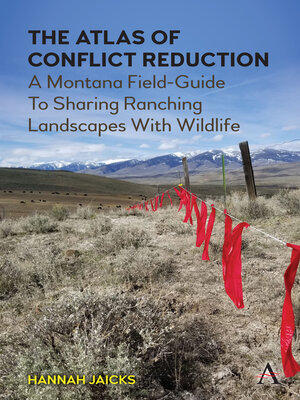The Atlas of Conflict Reduction
ebook ∣ A Montana Field-Guide To Sharing Ranching Landscapes With Wildlife · Science Diplomacy: Managing Food, Energy and Water Sustainably
By Hannah Jaicks

Sign up to save your library
With an OverDrive account, you can save your favorite libraries for at-a-glance information about availability. Find out more about OverDrive accounts.
Find this title in Libby, the library reading app by OverDrive.



Search for a digital library with this title
Title found at these libraries:
| Library Name | Distance |
|---|---|
| Loading... |
The book is a firsthand account of Dr. Hannah Jaicks' journey through western Montana's ranching landscapes to showcase the stories of ranchers and affiliated groups who are pioneering strategies for reducing conflicts with wildlife, while also stewarding the landscape. Often seen as antithetical to one another, American ranchers and wildlife have long been entangled with another. This book is about producers who are forging new paths in conservation and addressing these seemingly intractable entanglements to sustain working ranch operations alongside healthy wildlife populations. It elevates the voices of these people striving daily to achieve wild and working landscapes in the West and serves as a model for how others can begin to do the same. Dr. Jaicks takes readers on a journey up western Montana to a different valley in each chapter and showcases the place-based stories of everyday conservation heroes who provide consciously raised agricultural products and protect vital habitat for endemic wildlife that would otherwise be developed and subdivided beyond repair. This book will inform readers about progressive ways to make the world we share – with people and animals – a better place to live.
|The book is a firsthand account of Dr. Hannah Jaicks' journey through western Montana's ranching landscapes to showcase the stories of ranchers and affiliated groups who are pioneering strategies for reducing conflicts with wildlife, while also stewarding the landscape. Americans depend on these people who live by working on the land. Ranchers have the power to shape the future of our lands, waterways, and wildlife communities, but enduring perceptions frame ranching as a unilaterally destructive force to the environment. Perception is slippery ground to base an argument on, however, and reality is far more complicated. Often seen as antithetical to one another, American ranchers and wildlife have long been entangled with another. The book is about producers and partner organizations who are forging new paths in conservation and addressing these seemingly intractable entanglements to sustain working ranch operations alongside healthy wildlife populations. It elevates the voices of these people striving daily to achieve wild and working landscapes in the West and serves as a model for how others can begin to do the same.
The author takes readers on a journey up western Montana to a different valley in each chapter and showcases the place-based stories of everyday conservation heroes who practice regenerative ranching, provide consciously raised agricultural products, advance strategies for collaborative conservation and protect vital habitat for endemic wildlife that would otherwise be developed and subdivided beyond repair. Ethnographic storytelling is interwoven with psychological theories to inform readers about progressive ways to make the world we share – with people and animals – a better place to live. Illustrations by Katie Christiansen of wildlife and conflict-reduction tools accompany the text, helping to underscore the vivid realities of shared landscapes and how they are achieved.
There is no doubt the history of ranching is laden with problematic examples, and public and private rangelands are not universally in good condition today. This book aims to capture the increasing recognition that strong ranching practices coincide with good land and wildlife stewardship measures, but ranchers need help. If we want to see more of this remarkable work happening, environmentalists and concerned citizens need to step up and ensure these practices are not only possible but also become the norm. Everyone must be willing to come to the...







